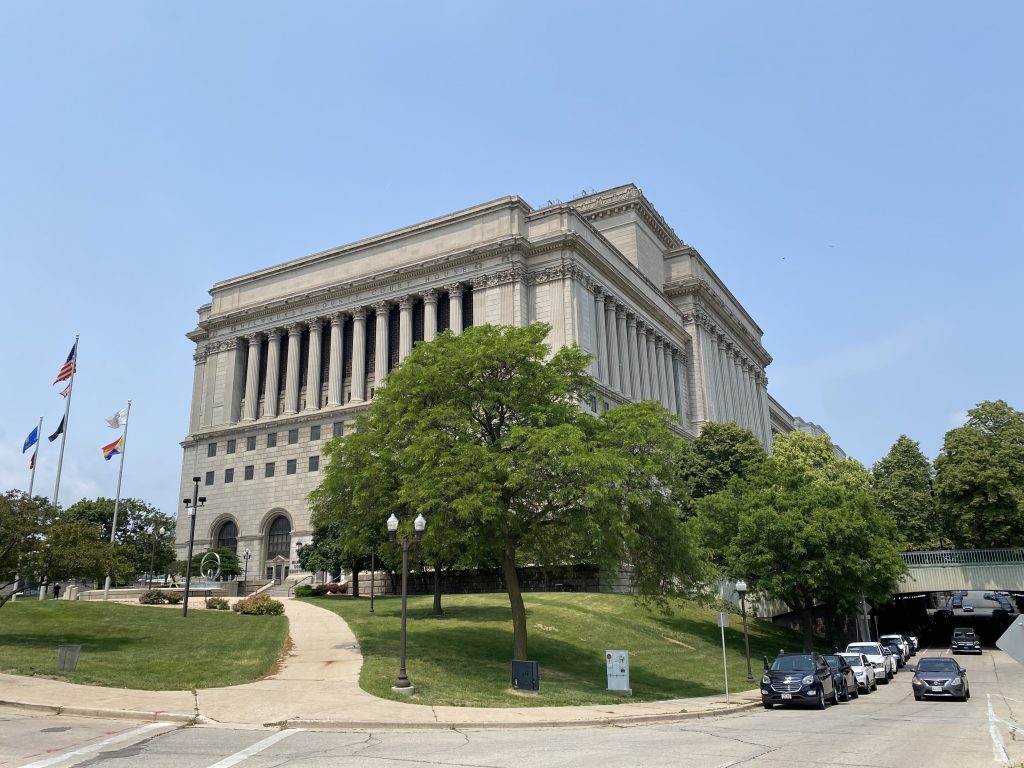Will County Board Approve Sales Tax Hike?
It's unclear if there's the needed two-thirds majority of board willing to vote for it.

Milwaukee County Courthouse. Photo by Graham Kilmer.
With the stroke of his pen Governor Tony Evers charted a new financial future for Milwaukee County Tuesday and also shook up the politics of county government.
The Republican-sponsored legislation gives the county board the authority to increase the countywide sales tax, and includes a bump in annual shared-revenue payments, but also comes with a number of new restrictions loathed by most of the Milwaukee County Board.
The state Assembly introduced the first iteration of the bill in April — a result of ongoing negotiations with Milwaukee leaders and municipal and county officials across the state. After the Assembly passed it, the Senate made several changes. Of note, the Senate raised the sales tax increase that the county has now been authorized to levy from 0.375% to 0.4% and they left it up to two-thirds of the county board to approve it rather than requiring the approval of county voters in a referendum.
The state Department of Revenue estimates the 0.4% increase to the county’s existing .5% sales tax will bring in approximately $80 million in additional revenue annually. The new revenue must be used to pay down the county’s outstanding pension obligations or for public safety. It will be in effect until the county’s retirement is fully funded, or for 30 years, whichever comes first.
The two-thirds requirement means at least 12 of the 18 county board members must approve the sales tax. How supervisors react to this needed supermajority is also a preview of board politics to come. The bill also included a provision that made it the required threshold for the board to create new spending or county positions. Right now, it’s unclear if the board has the votes needed to increase the county sales tax.
When the Senate passed the legislation on June 14, sending it to Evers’ desk, County Executive David Crowley released a statement saying, “As deliberations on the sole issue of additional revenue turn to local legislative bodies, we look forward to productive conversations with county leaders and encouraging decisionmaking that aligns with community needs.”
Once the bill was signed by Evers, Crowley once again repeated that he was looking forward to these conversations that encourage decisions in line with community needs. As the county executive sees it, the legislation “brings us closer to avoiding a devastating fiscal cliff and continue critical service our residents rely on each day.” He said “there is too much at stake” for the county as it stares down a daunting fiscal cliff. “This is a generational opportunity to secure our financial future and continue offering the services that keep residents healthy and safe.”
Only one supervisor, Ryan Clancy, told Urban Milwaukee he was an outright no on the question of the sales tax. “I oppose the shared revenue bill at the state, and I oppose a county sales tax, as it’s regressive and falls disproportionately on our poor and working-class residents,” he said. But it’s rumored there is at least one more ‘no’ vote who as of yet remains nameless.
Despite the narrow question before them, supervisors aren’t going into this vote thinking only of a 0.4% increase in the sales tax and what that means for the county board’s bottom line. Some are still smarting about the restrictions being placed on the City of Milwaukee and the county, and have been since they were first made public.
Of the handful of supervisors that Urban Milwaukee was able to reach for comment on the sales tax question, only three were sure they would vote for the legislation. Most supervisors did not respond to requests for comment. Sup. Deanna Alexander declined to comment at this time. And five others expressed some variation of uncertainty on the question before them.
Sup. Kathleen Vincent told Urban Milwaukee “the strings attached do concern me.” These include a new two-thirds majority needed to pass any new spending or create new positions, a ban on most advisory referendums, and law enforcement staffing mandates that could cost the county 15% of its shared revenue if not met.
Supporters of the deal don’t like these provisions either. Crowley himself has expressed that he does not like the restrictions being placed on the city and the county. “Bipartisan legislation often means that not everyone will get everything on their wish list,” he said in a statement. “While our desire for autonomy remains steadfast, it is vital that Milwaukee County, as an arm of the state, acknowledges the fiscal realities that we must confront.”
Vincent said she knows the county needs a solution to its budget problems, and that she is leaning “more in favor at this point.” But she has not made her final decision yet, and said she wants more feedback from her residents. “I, personally, would have liked to have seen this go to referendum,” Vincent said. “But my understanding is, they felt the referendum would have failed.”
Sup. Peter Burgelis has chosen a similar line, opting to plant himself on the fence until he can gauge constituent opinion. Asked if he will vote for a sales tax increase, he said, “Need to hear from constituents, but I can’t think of a fiscal reason not to.”
Sup. Steve Taylor is also undecided, though he thinks the board will ultimately pass the sales tax increase. “But I’m also going to realize that this could be a close vote, and I’m going to make sure that I do the best job negotiating what’s in the best interest for the people that I represent,” he said. In recent months, the supervisor has made clear that he feels his district, which includes Franklin and Oak Creek, has been shortchanged by the county in terms of investment in parks and infrastructure.
Sup. Juan Miguel Martinez, the other socialist on the board along with Clancy, told Urban Milwaukee he remains undecided on the question of the sales tax.
Sup. Felesia Martin said she does not have all the information she needs to make a decision just yet. “I have to read further and have submitted some questions for clarification,” she said. “And so I need some answers before I can make that determination.”
Supervisors Shawn Rolland and Liz Sumner are decidedly for it.
“Candidly, as a dad of three teenagers, I want my children to choose to stay here, live here, work here, and raise families here. I want all of our kids to feel like there is no place as special as our county,” Rolland said. “Milwaukee County needs funding to avoid its fiscal cliff and to attract our next generation — and that’s why I’ll be voting yes.”
Sumner said she plans to vote for the increase, adding “I wish it was at least .5% or even 1% but I do think it will help tremendously with county finances and our ability to provide the services we are mandated by Madison to provide plus also support parks and other amenities county residents appreciate and enjoy.”
If you think stories like this are important, become a member of Urban Milwaukee and help support real, independent journalism. Plus you get some cool added benefits.
More about the Local Government Fiscal Crisis
- Mayor Johnson’s Budget Hikes Fees, Taxes In 2025, Maintains Services - Jeramey Jannene - Sep 24th, 2024
- New Milwaukee Sales Tax Collections Slow, But Comptroller Isn’t Panicking - Jeramey Jannene - Jun 28th, 2024
- Milwaukee’s Credit Rating Upgraded To A+ - Jeramey Jannene - May 13th, 2024
- City Hall: Sales Tax Helps Fire Department Add Paramedics, Fire Engine - Jeramey Jannene - Jan 8th, 2024
- New Study Analyzes Ways City, County Could Share Services, Save Money - Jeramey Jannene - Nov 17th, 2023
- New Third-Party Study Suggests How Milwaukee Could Save Millions - Jeramey Jannene - Nov 17th, 2023
- Murphy’s Law: How David Crowley Led on Sales Tax - Bruce Murphy - Aug 23rd, 2023
- MKE County: Supervisors Engage in the Great Sales Tax Debate - Graham Kilmer - Jul 28th, 2023
- MKE County: County Board Approves Sales Tax - Graham Kilmer - Jul 27th, 2023
- County Executive David Crowley Celebrates County Board Vote to Secure Fiscal Future and Preserve Critical Services for Most Vulnerable Residents - County Executive David Crowley - Jul 27th, 2023
Read more about Local Government Fiscal Crisis here
Political Contributions Tracker
Displaying political contributions between people mentioned in this story. Learn more.
- December 17, 2015 - David Crowley received $50 from Felesia Martin
MKE County
-
J.D. Vance Plays Up Working Class Roots, Populist Politics in RNC Speech
 Jul 17th, 2024 by Graham Kilmer
Jul 17th, 2024 by Graham Kilmer
-
Ron Johnson Says Free-Market Principles Could Fix Education
 Jul 17th, 2024 by Graham Kilmer
Jul 17th, 2024 by Graham Kilmer
-
RNC Will Cause Some County Services To Be Moved to Wauwatosa
 Jul 12th, 2024 by Graham Kilmer
Jul 12th, 2024 by Graham Kilmer





















